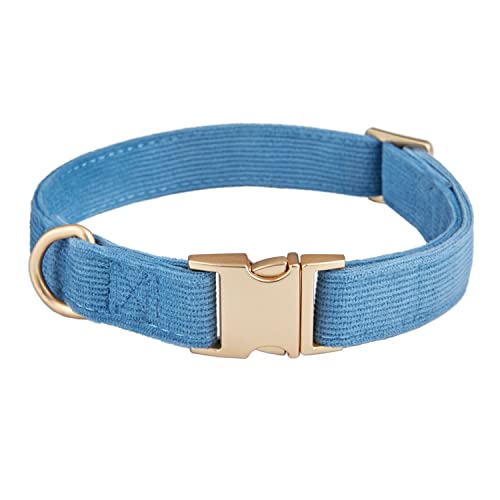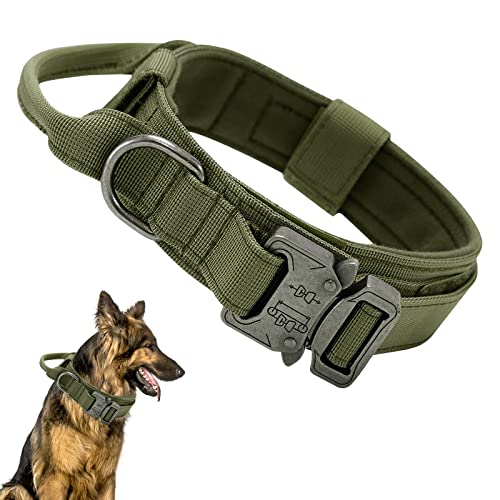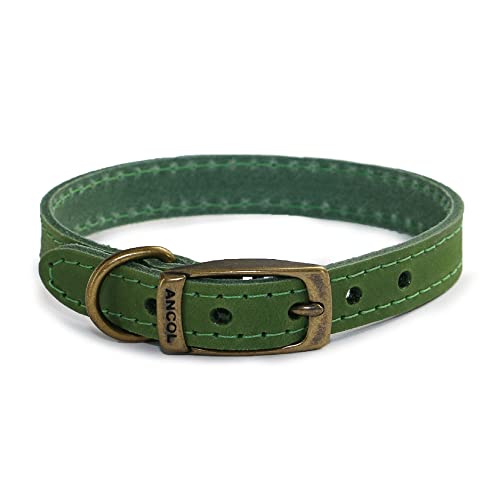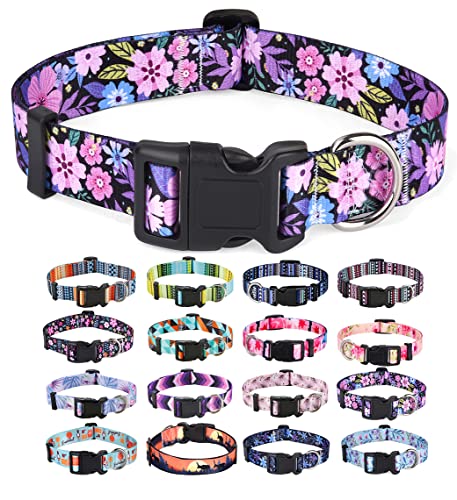Understanding the Different Types of Dog Collars: Which One Suits Your Dog Best
Flat Collars
Flat collars are perhaps the most common type of collar we encounter, and they work well for everyday use. They feature a simple design with a buckle or snap to fasten it around your dog’s neck. Since they come in various materials and styles, they can suit almost any breed. If your dog is well-trained and generally calm, a flat collar is an excellent choice.
Martingale Collars
Martingale collars are popular for dogs who may have a tendency to slip out of their collars. They’re designed with a loop that tightens when the dog pulls, without causing choking. This feature provides extra control and is particularly beneficial for breeds with narrower heads compared to their necks, like Greyhounds. These collars are ideal for training purposes or for dogs who may need that extra bit of security.
Harnesses
While technically not a collar, harnesses are worth mentioning as they provide an alternative method for controlling a dog. They distribute pressure over the dog’s body, which can be more comfortable and safer than a collar, especially for small breeds or dogs with respiratory issues. Additionally, harnesses are great for dogs who tend to pull on the lead, as they can help prevent neck injuries.
Chain Collars
Chain collars, also known as choke chains, are designed primarily for training. However, they require careful handling and should not be used as everyday collars. Harsher than other types, these collars should only be used by experienced handlers who understand how to use them safely. We advise opting for gentler alternatives for regular use.
Key Features to Look for in a Dog Collar: Safety and Comfort Considerations
Adjustability
We should look for collars that feature adjustable sizing. This allows for a snug fit that ensures the collar won’t slip off or be too tight, which could cause discomfort or injury. A well-fitted collar should allow you to fit two fingers between the dog’s neck and the collar.
Buckle Type
The type of fastening mechanism is crucial for safety and ease of use. We recommend collars with sturdy and reliable buckles. Quick-release buckles are especially user-friendly as they can be swiftly taken off in emergencies.
D-Ring for Leash Attachment
Ensure the collar comes equipped with a durable D-ring for attaching a leash. This attachment point should be robust enough to withstand pulling, as it’s where much of the strain occurs when your dog is on the lead. Opt for a metal D-ring that offers reliability.
Reflective Elements
For added safety during night walks, consider collars with reflective elements. This helps increase visibility, making it easier for you to see your dog and for others to spot you both during evening outings.
Padding and Material
Collars with sufficient padding enhance comfort, particularly for long-wearing situations. Look for materials that are soft against your dog’s neck but still durable enough to withstand daily use. The collar should feel gentle, especially for dogs with sensitive skin.
Choosing the Right Size: How to Measure Your Dog for a Collar
Getting the Right Fit
To find the perfect collar size, we need to measure the circumference of your dog’s neck. Using a soft measuring tape or a piece of string, wrap it around the thickest part of the neck, ensuring it’s comfortably snug—not too tight or loose. Write down the measurement in centimetres or inches.
Considering Breeds and Sizes
Different breeds have varying neck shapes and sizes, so it’s essential to choose a collar that fits your dog’s specific needs. For instance, a Chihuahua will need a far smaller collar than a Great Dane. Many manufacturers provide a sizing chart to help with the selection, ensuring that we don’t guess when choosing the right size.
Fitting Room Test
Once you’ve selected a collar based on your measurements, it’s wise to do a fitting room test. When you put the collar on your dog, check again by ensuring you can slip two fingers between the collar and your dog’s neck. If it’s too tight or too loose, go back for another size.
Material Matters: Exploring Options for Durability and Style
Nylon Collars
Nylon collars are a popular choice thanks to their affordability and variety of designs. They come in numerous colours and patterns, making it easy to find something that matches your dog’s personality. They’re generally quite durable, although they can absorb moisture and might retain odours if not cleaned regularly.
Leather Collars
For a classic look, leather collars are an excellent option. They are durable and tend to get softer over time, which adds to the comfort. While they may require more maintenance to keep them looking good, they offer longevity when properly cared for.
Quick-Dry Fabrics
For active dogs who love water or muddy adventures, collars made from quick-dry materials are ideal. These collars dry rapidly, reducing the risk of irritation on the neck caused by damp fabric. Look for collars specifically labelled as water-resistant for the best results.
Stylish Designs
Don’t overlook the style aspect when choosing a collar! Many manufacturers offer collars that not only serve a functional purpose but also make a fashion statement. We can find collars adorned with fun prints or embellishments that can express our dog’s unique character.
Personalising Your Dog Collar: Adding a Touch of Individuality
Embroidered Names
Adding your dog’s name to their collar can provide both individuality and an extra safety measure. Embroidery can be done directly on the collar, which not only adds a personal touch but also helps identify your pet if they ever get lost.
ID Tags
In addition to personalisation, consider attaching an ID tag to the collar. This tag can include vital information such as your phone number and even a medical alert if needed. Tags can come in various styles to match the collar, enhancing the overall look.
Custom Designs
Some manufacturers offer the possibility to create a completely custom collar with unique designs, colours and materials. This is an opportunity for us to have a collar that stands out and truly represents our dog’s personality.
Seasonal Collars
For those who love celebrating the seasons, choosing collars that can be switched out based on the time of the year is a fun idea. Whether it’s festive designs for the holidays or bright patterns for summer, seasonal collars provide variety and allow your dog to express themselves with every change of attire.


































